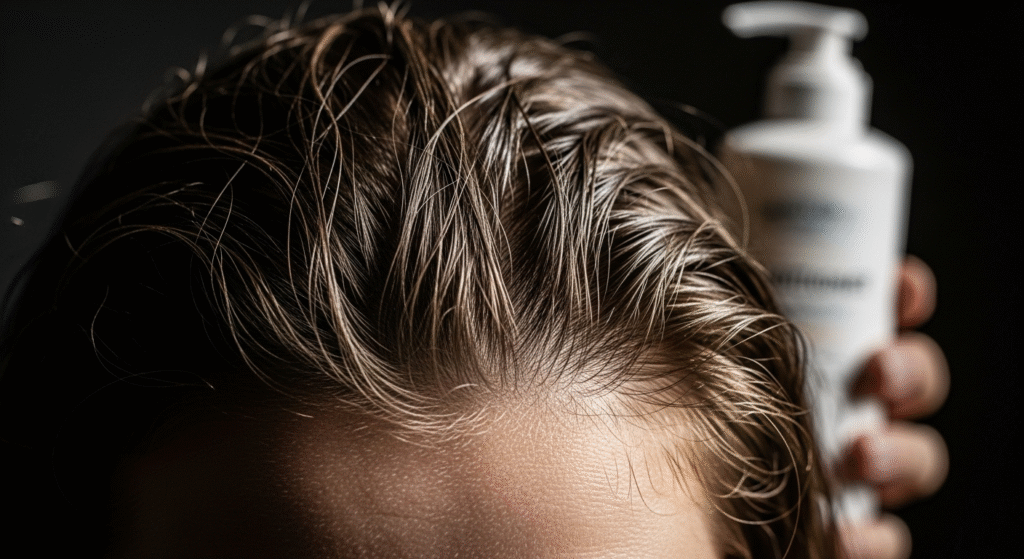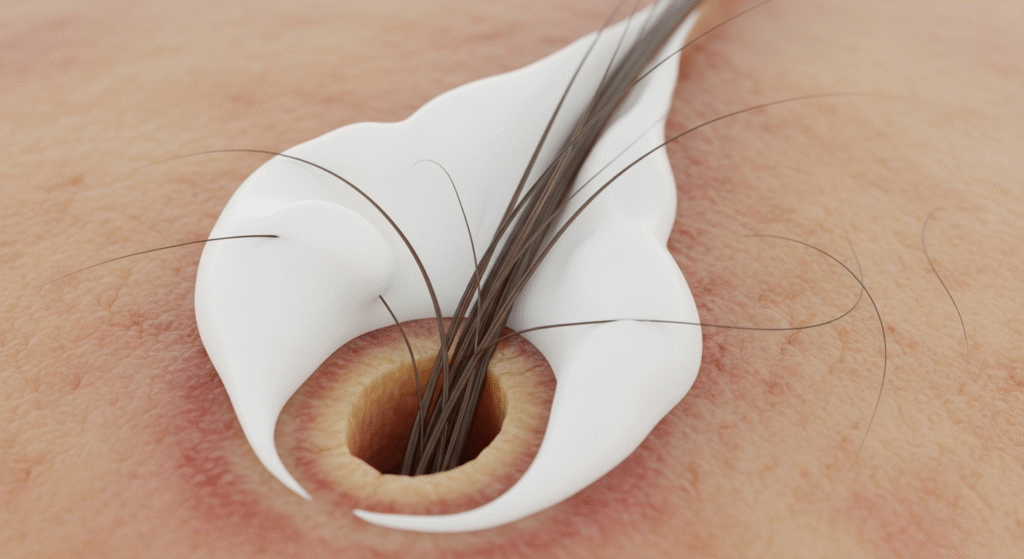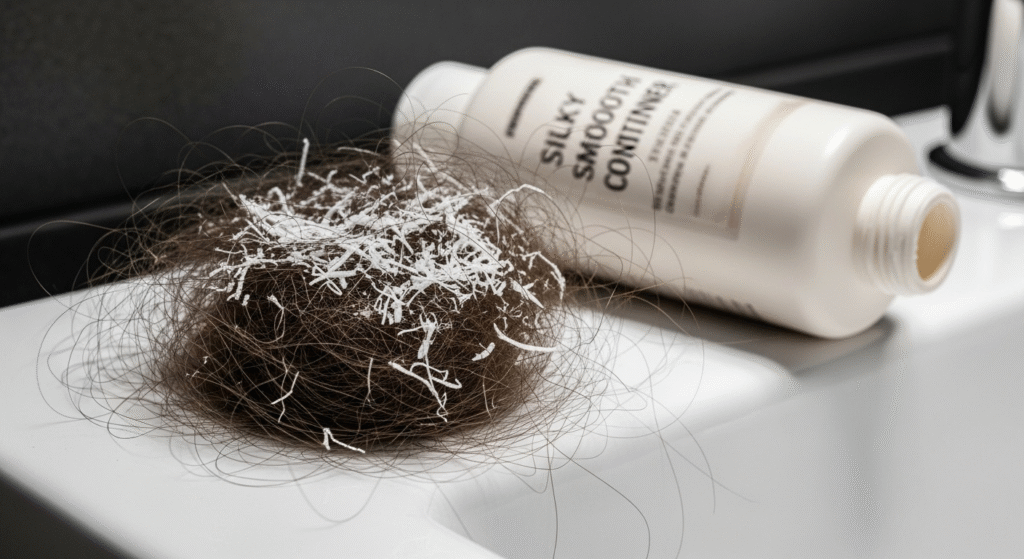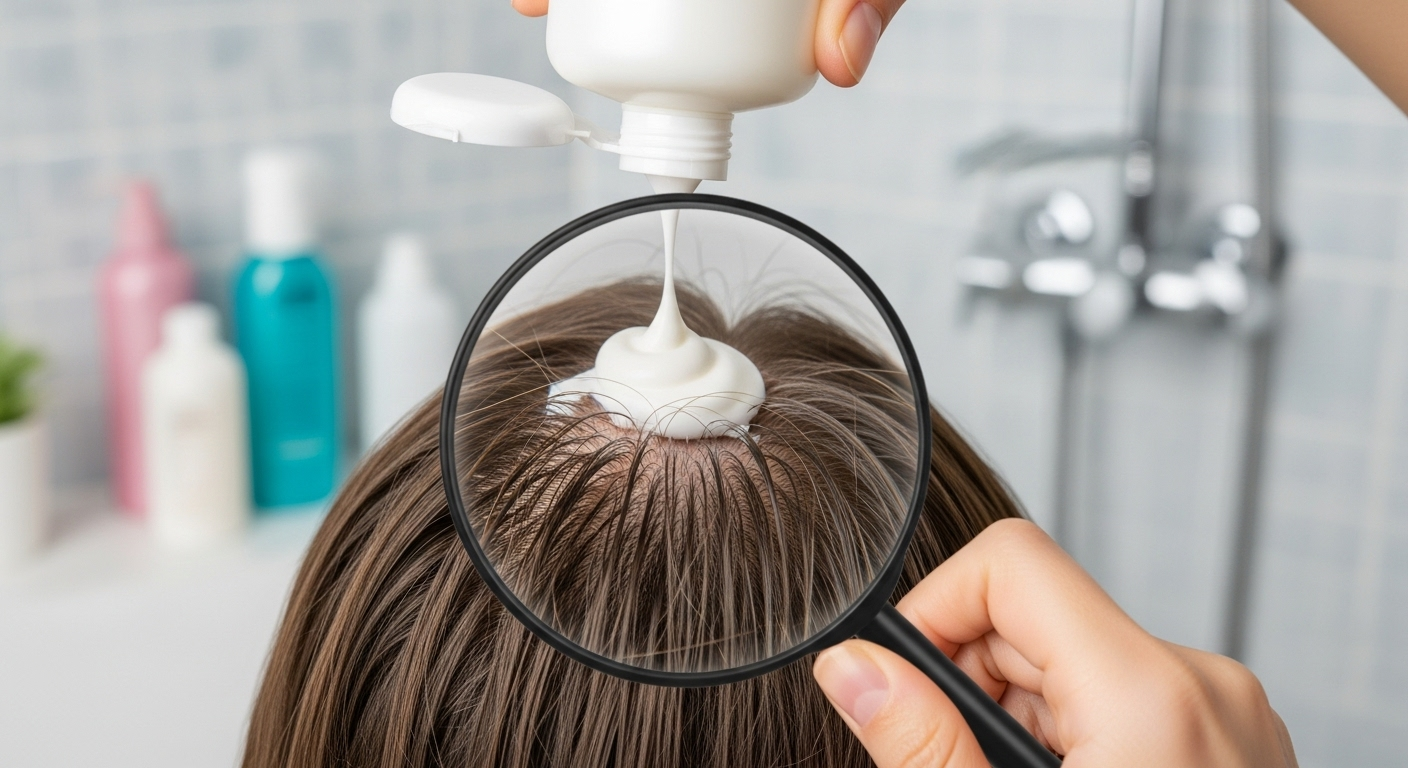Can too much conditioner cause hair loss? This is a common concern for many people who want to maintain healthy, shiny hair. While conditioners are essential for moisturizing and improving hair texture, using too much can have unintended consequences. Over-conditioning can lead to hair breakage, limpness, or even thinning over time. In this article, we’ll …
Can too much conditioner cause hair loss? This is a common concern for many people who want to maintain healthy, shiny hair. While conditioners are essential for moisturizing and improving hair texture, using too much can have unintended consequences.
Over-conditioning can lead to hair breakage, limpness, or even thinning over time. In this article, we’ll explain how too much conditioner might impact your hair health, how to recognize the signs of over-conditioning, and the expert-backed tips to keep your hair healthy without the risk of damage.

What Is Over-Conditioning?
Over-conditioning occurs when you apply more conditioner than necessary or use it too frequently. Conditioners are designed to hydrate, nourish, and protect hair, but excessive use can disrupt the balance, leading to unwanted effects.
- Common Causes of Over-Conditioning:
- Using a heavy conditioner on fine or oily hair
- Conditioning hair too often, especially with thick formulas
- Applying conditioner to the scalp instead of just the ends
- Not rinsing conditioner thoroughly
Over-conditioning doesn’t always happen overnight. It may take a while for the buildup of product residue to show its effects, but it can lead to significant changes in the appearance and health of your hair.
How Over-Conditioning Affects Hair Health

While conditioners are important for maintaining hair health, excessive use can cause several problems:
- Weighs Down Hair: Excessive conditioner can make hair feel heavy, greasy, and weighed down, especially if your hair is fine or thin. This can reduce volume and make hair appear limp and lifeless.
- Clogs Hair Follicles: Product buildup from over-conditioning can clog hair follicles, leading to scalp issues like dandruff or irritation. Over time, this can hinder healthy hair growth and may even contribute to thinning hair.
- Reduces Volume: Hair that is too moisturized may lack body. You might notice your hair seems flatter or doesn’t hold volume as well as it did before over-conditioning. This can happen when the moisture balance in your hair is disrupted by excessive product application.
- Increases Breakage: Hair that is overly moisturized can become too soft and weak. Over-moisturized hair is more prone to breaking, especially when brushed or styled.
Signs You Might Be Over-Conditioning Your Hair

Recognizing the signs of over-conditioning is key to maintaining healthy hair. If you experience any of the following, you might be applying too much conditioner:
- Flat, Limp Hair: Your hair may lose its volume and appear greasy or lifeless.
- Greasy or Oily Hair: Hair appears oily even after washing, especially near the roots.
- Difficulty Styling: Over-conditioned hair may feel heavy and unmanageable, making it harder to style.
- Increased Hair Breakage: You notice more strands breaking off when brushing or combing.
These signs indicate that your hair may be receiving more moisture than it needs, which can lead to long-term damage if not addressed.
Proper Conditioner Usage Tips
To avoid over-conditioning your hair, here are a few expert-backed tips for proper conditioner use:
- Choose the Right Conditioner: Select a conditioner that matches your hair type. If you have fine hair, use a lightweight conditioner, and if you have thick or coarse hair, use a richer formula. Avoid heavy conditioners that are not suited to your hair type.
- Apply Correctly: Use a small amount of conditioner—about a nickel-sized amount for medium-length hair. Focus on the mid-lengths and ends, where hair tends to be drier. Avoid applying conditioner directly to your scalp, as this can cause clogging of hair follicles.
- Rinse Thoroughly: Make sure you rinse out all conditioner to prevent buildup. Leaving conditioner in your hair can weigh it down and lead to scalp issues.
- Condition Frequency: Conditioner use depends on your hair type and condition. For most people, conditioning 2-3 times a week is sufficient. If you feel your hair is overly moisturized, cut back on conditioner or switch to a lighter formula.
How to Fix Over-Conditioned Hair
If you’ve over-conditioned your hair, there are steps you can take to restore balance:
- Clarifying Shampoo: Use a clarifying shampoo once a week to remove excess product buildup. This will help reset your hair’s moisture balance and restore its natural texture.
- Deep Conditioning: After using clarifying shampoo, apply a deep conditioner to help restore moisture and repair any damage caused by over-conditioning.
- Avoid Heat Styling: Excessive heat can exacerbate the dryness or breakage caused by over-conditioning. Reduce the use of heat tools, such as straighteners and curling irons, to prevent further damage.
- Regular Trims: Trim your hair regularly to remove split ends and encourage healthy growth. This will also help improve the appearance of your hair if it’s become limp or lifeless due to over-conditioning.
When to Consult a Specialist
If you’re noticing increased hair thinning or breakage, it may be time to consult a hair care specialist. A dermatologist or trichologist can assess your hair health, provide personalized advice, and suggest solutions tailored to your specific needs.
- Persistent Hair Shedding: If hair shedding continues or becomes more severe despite following proper conditioning practices, professional help may be necessary.
- Scalp Issues: If you experience scalp irritation, redness, or flaking, it’s important to address the issue with a specialist, as this may be a sign of buildup or an underlying condition.
- Localized Bald Spots: If you notice areas of hair loss or bald spots, a specialist can evaluate your scalp and recommend treatment options.
FAQs
Can too much conditioner cause hair loss?
Excessive conditioner can lead to product buildup, scalp irritation, and breakage, which may contribute to hair thinning over time.
How often should I condition my hair?
Most people should condition their hair 2-3 times a week. However, if you have dry or coarse hair, you may need to condition more frequently.
What’s the best way to apply conditioner?
Apply conditioner from the mid-lengths to the ends of your hair, avoiding the scalp. Use a small amount and rinse thoroughly.
How can I fix over-conditioned hair?
Use a clarifying shampoo, follow with deep conditioning, and avoid heat styling until your hair recovers.
When should I see a doctor about hair loss?
If hair loss continues or worsens, or if you experience scalp irritation or redness, consult a dermatologist or trichologist for advice.
Conclusion
While conditioners are essential for hair care, over-conditioning can lead to hair damage, thinning, and breakage. By using the right conditioner for your hair type, applying it correctly, and rinsing thoroughly, you can maintain healthy hair without the risk of over-conditioning. If you notice signs of damage, taking action early will help restore your hair’s health and vitality.
If you’re concerned about hair loss or hair health due to over-conditioning, our expert trichologists are here to help. Book a consultation Dr. Uzma Irfan, an ISHRS-certified surgeon in Islamabad today, to receive personalized advice and solutions tailored to your hair’s needs.






